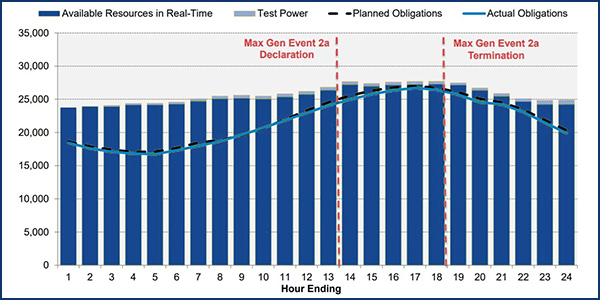By Amanda Durish Cook
MISO’s effort to improve a key communication system will come too late to smooth summertime emergency procedures, stakeholders said last week.
In post-mortems of a January emergency event in which less than a quarter of load-modifying resources (LMRs) performed to the RTO’s criteria, multiple stakeholders complained the MISO Communications System (MCS) was difficult to understand and navigate.
The poor generator performance resulted in MISO last month issuing market participants nearly $2 million in penalties and disqualifying 21 LMRs for the remainder of the 2018/19 planning year. (See “MISO: $2 Million in Penalties for Jan. 30 LMR Underperformance,” MISO Reliability Subcommittee Briefs: May 2, 2019.)
As a result, MISO is seeking to improve how LMR owners interact with the nonpublic MCS webpage. (See MISO to Fix Communications System Shortcomings.)
During a Reliability Subcommittee (RSC) conference call Thursday, Chair Bill SeDoris said the low LMR success rate in January is evidence of “serious procedural issues on both sides of the house.”
Customized Energy Solutions’ Ted Kuhn criticized the RSC for scheduling MCS improvement discussions for the third quarter, saying MISO is likely to call multiple summertime emergencies using an inadequate system while market participants wait on improvements.
“The current MCS is not sufficient. … Some of these things need to get fixed,” Kuhn said. Other call participants repeated the plea for quicker improvements.
SeDoris said MISO’s nonpublic Reliable Operations Working Group (ROWG) has taken up short-term improvements, including clearer communication when the RTO terminates a maximum generation alert.
Ron Arness, MISO director of Central Region operations, said the ROWG had a “healthy” discussion on how to improve usability of the MCS on Wednesday.
“There are some changes coming; those changes aren’t going to occur overnight. … Be patient with us,” Arness said.
But stakeholders say a mid-May emergency in MISO South already illustrates that the MCS is ill-suited for emergency communications. WPPI Energy economist Valy Goepfrich said when MISO called the May 16 maximum generation alert, it wasn’t clear the alert only extended to the South region.
MISO South May Emergency
MISO said the five-hour May 16 emergency was atypical, the result of a higher-than-normal forced outage rate combined with above-average temperatures and the usual spring maintenance season.
“While unplanned outages are expected, the successive loss of [about] 4 GW of generation in a short period of time is outside normal expected operating conditions,” MISO said.
Outages and derates in MISO South reached 16.6 GW that day, and load obligations hit a peak of about 27 GW around 5 p.m. MISO said it was able to maintain reliability through two separate calls for LMRs with lead times of three hours or fewer. The RTO will provide LMR response data at a later date.
Arness said MISO South frequently experienced tight capacity conditions over the last three weeks of May.
The RTO expects tight operating conditions in South through June due to hotter weather and continuing maintenance activity. Arness told stakeholders to be prepared for more emergency alerts in the region.
Goepfrich noted that MISO didn’t come close to hitting the North-South transfer limit during the event and asked that it ensure that transfer capability is used before it calls on LMRs.
Outage Exemption Talk Ongoing
MISO last week also said it will expand a penalty exemption to include resources that return early from a planned outage, part of new outage scheduling rules.
The RTO will exempt resources from accreditation penalties if the start and end date of their submitted outages remain within 10% of the originally scheduled outage window “and/or [the resource] reduces the capacity of the outage” to provide MISO with more available capacity.
MISO originally proposed that unit owners submit a new outage request for both extended and shortened outages to allow it to evaluate the request based on maintenance margin supply predictions, putting a resource’s penalty exemption at risk. Units earn penalty exemptions if they schedule an outage at least four months in advance. However, stakeholders questioned the potential for MISO to revoke the penalty exemption on even shortened outages. (See “MISO Taking Second Look at Outage Change Penalties,” MISO Reliability Subcommittee Briefs: May 2, 2019.)
Jeanna Furnish, MISO manager of outage coordination, said the RTO still seeks to discourage “bad behavior” when participants schedule planned outages. She said significant shortening of outages impacts MISO data and forecasting and affects other available megawatts.
“We want the best information we can get about your outage schedule. We want you to return early if you reliably can … but we want to acknowledge this isn’t a free pass to schedule the longest outage you can then reduce,” Furnish said.
Some stakeholders still weren’t satisfied with MISO’s compromise.
“You’re creating a huge disincentive for generation to shorten their outages,” CES’ David Sapper said.
Furnish said she rarely sees generation return significantly early from outages, adding that many generators actually lengthen planned outages.
MISO Director of Resource Adequacy Coordination Laura Rauch said the RTO is seeking to “strike a balance” to prevent generators from scheduling longer-than-necessary outages simply for the wiggle room.
Furnish put the 10% proposal to a round of feedback and encouraged stakeholders to offer exemption alternatives.






